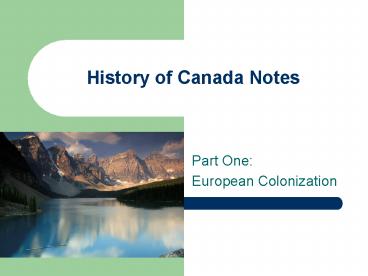History of Canada Notes - PowerPoint PPT Presentation
1 / 21
Title:
History of Canada Notes
Description:
History of Canada Notes Part One: European Colonization The First Nations Native peoples of Canada Came from Asia 12,000 years ago Crossed Bering Land Bridge that ... – PowerPoint PPT presentation
Number of Views:156
Avg rating:3.0/5.0
Title: History of Canada Notes
1
History of Canada Notes
- Part One
- European Colonization
2
The First Nations
- Native peoples of Canada
- Came from Asia 12,000 years ago
- Crossed Bering Land Bridge that joined Russia to
Alaska - 12 tribes made up the First Nations
3
Inuit
- One of the First Nation tribes
- Still live in Canada today
- 1999Canadas government gave the Inuit Nunavut
Territory in northeast Canada
4
The Europeans in Canada
- First explorers to settle Canada were Norse
invaders from the Scandinavian Peninsula - In 1000 CE, they built a town on the northeast
coast of Canada established a trading
relationship with the Inuit - The Norse deserted the settlement for unknown
reasons - Europeans did not return to Canada until almost
500 years later
5
A Viking Ship
6
(No Transcript)
7
England Claims Newfoundland
- Italian explorer John Cabot, sailed to Canadas
east coast in 1497 - Cabot claimed an area of land for England (his
sponsor) named it Newfoundland
8
John Cabot
9
New France
- Jacques Cartier sailed up the St. Lawrence River
in 1534 - claimed the land for France
- French colonists named the area New France
10
New France (Quebec)
- 1608--Samuel de Champlain built the first
permanent French settlement in Quebec - Population grew slowly
- Many people moved inland to trap animalshats
made of beaver fur were in high demand in Europe
11
Samuel de Champlain
12
New France (Quebec)
- European fur traders were joined by French
farmers, merchants, and missionaries from the
Catholic Church - Brought with them French laws, traditions,
religion - France wouldnt let anyone move to New France who
was not Catholic
13
(No Transcript)
14
The British in Canada
- British colonized region south of New France
- Saw New Frances success in fur trapping wanted
to take control of the fur trade - Led to the French and Indian War in 1754
15
French and Indian War (1754)
- Great Britain and Iroquois Indians versus France
and Huron Indians - Great Britain fought for control of Canadian
territory the fur trade - Conquered Quebec in 1754 and forced France to
sign the Treaty of Paris in 1763
16
Treaty of Paris (1763)
- Gave British control of all lands east of the
Mississippi River, except for 2 islands off of
Newfoundland - British forced Nova Scotias French-speaking
people to leave - Nova Scotias French went to another French
colony, Louisianadescendants of these people are
the Cajuns
17
Quebec Act--1774
- British allowed French to stay in Quebec, but
continued to control the region - Quebec Act guaranteed the French the right to
maintain their culture (language, religion,
traditions)
18
American Revolution
- 1776Americans gained independence from Great
Britain - This initiated a huge cultural change in Canada
- Americans who did not believe in independence
left America and moved to Quebec - These people were called Loyalists because they
were loyal to Great Britain - ResultQuebec began to have people who spoke
English as well as French
19
Quebec Act (1774)
- Many Loyalists did not want to live among French
speaking Canadians - Cultural difference between the English speakers
French speakers sparked many conflicts - 1774British government passed the Quebec Act
20
Quebec Acts Results
- Gave French Canadians in Quebec the right to
continue practicing the Catholic religion and
allowed French civil law - Loyalists were irritated with the new political
cultural power of the French - Could not own land or have representation in
Quebecs government - The differences among the two groups eventually
led to a re-division of the country
21
Division of Canada
- Most English speaking citizens lived in Upper
Canada (Ontario) - Most French speaking citizens lived in Lower
Canada (Quebec)
D D D































